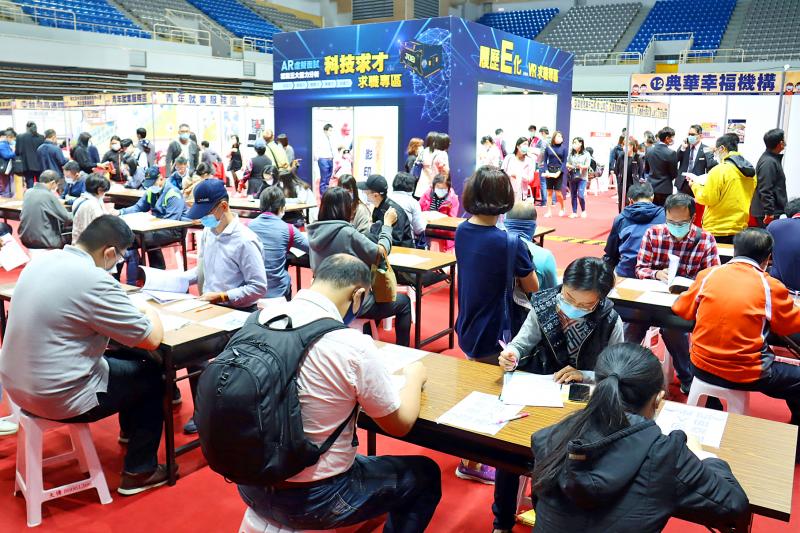About 70 percent of employers in the nation intend to recruit new employees in the fourth quarter of this year, as the local economy seems to be stabilizing amid efforts to contain the COVID-19 outbreak in Taiwan, the online 1111 Job Bank (1111人力銀行) said last week.
Although the fourth quarter is usually a slow season in the job market, a higher percentage of employers plan to hire during the period than the peak second and third quarters, when the ratio was 66 percent and 67 percent respectively, the job bank said, citing a survey.
Local employment was affected by the COVID-19 pandemic in the second and third quarters, and hiring was postponed to the fourth quarter, the job bank’s media center head Henry Ho (何啟聖) said.

Photo: Wong Yu-huang, Taipei Times
Many employees in Taiwan prefer not to change jobs in the fourth quarter before year-end bonuses are paid, while recruitment usually spikes in the second and third quarters as first-time jobseekers enter the market, the job bank said.
Of the employers who are planning to hire new personnel in the fourth quarter, those in the construction and property sectors seemed the most eager, as the housing market has been showing signs of improving, the survey said.
Last month, transactions of homes, shops, offices and factories in Taiwan rose more than 36 percent from a year earlier to 243,000 units, the job bank said.
Employers in the service sector, particularly restaurant operators, are also keen to recruit new workers, as domestic consumption has been increasing since the government issued NT$50 billion (US$1.73 billion) worth of Triple Stimulus Vouchers in July to help spur private consumption, the poll found.
Employers in the information and communications technology industry are looking to hire new workers given the advent of 5G technology in Taiwan, Ho said.
The emerging technology has created new jobs in a wide range of segments, such as semiconductors, small base stations, the Internet of Things, smart machinery and long-distance medical care, he said.
However, while demand for new personnel is increasing, 73 percent of employers are worried about finding the right workers for their businesses, the poll said.
The survey, conducted from Oct. 12 to 16, collected 874 valid questionnaires, the job bank said.

To many, Tatu City on the outskirts of Nairobi looks like a success. The first city entirely built by a private company to be operational in east Africa, with about 25,000 people living and working there, it accounts for about two-thirds of all foreign investment in Kenya. Its low-tax status has attracted more than 100 businesses including Heineken, coffee brand Dormans, and the biggest call-center and cold-chain transport firms in the region. However, to some local politicians, Tatu City has looked more like a target for extortion. A parade of governors have demanded land worth millions of dollars in exchange

An Indonesian animated movie is smashing regional box office records and could be set for wider success as it prepares to open beyond the Southeast Asian archipelago’s silver screens. Jumbo — a film based on the adventures of main character, Don, a large orphaned Indonesian boy facing bullying at school — last month became the highest-grossing Southeast Asian animated film, raking in more than US$8 million. Released at the end of March to coincide with the Eid holidays after the Islamic fasting month of Ramadan, the movie has hit 8 million ticket sales, the third-highest in Indonesian cinema history, Film

Taiwan Semiconductor Manufacturing Co’s (TSMC, 台積電) revenue jumped 48 percent last month, underscoring how electronics firms scrambled to acquire essential components before global tariffs took effect. The main chipmaker for Apple Inc and Nvidia Corp reported monthly sales of NT$349.6 billion (US$11.6 billion). That compares with the average analysts’ estimate for a 38 percent rise in second-quarter revenue. US President Donald Trump’s trade war is prompting economists to retool GDP forecasts worldwide, casting doubt over the outlook for everything from iPhone demand to computing and datacenter construction. However, TSMC — a barometer for global tech spending given its central role in the

Alchip Technologies Ltd (世芯), an application-specific integrated circuit (ASIC) designer specializing in server chips, expects revenue to decline this year due to sagging demand for 5-nanometer artificial intelligence (AI) chips from a North America-based major customer, a company executive said yesterday. That would be the first contraction in revenue for Alchip as it has been enjoying strong revenue growth over the past few years, benefiting from cloud-service providers’ moves to reduce dependence on Nvidia Corp’s expensive AI chips by building their own AI accelerator by outsourcing chip design. The 5-nanometer chip was supposed to be a new growth engine as the lifecycle